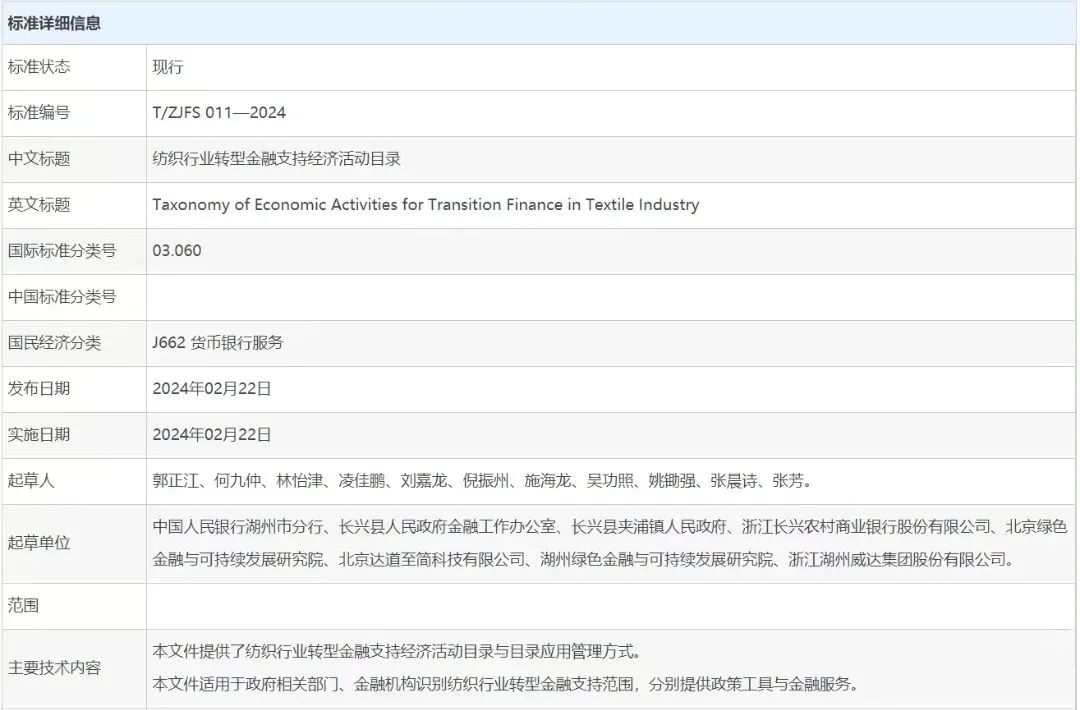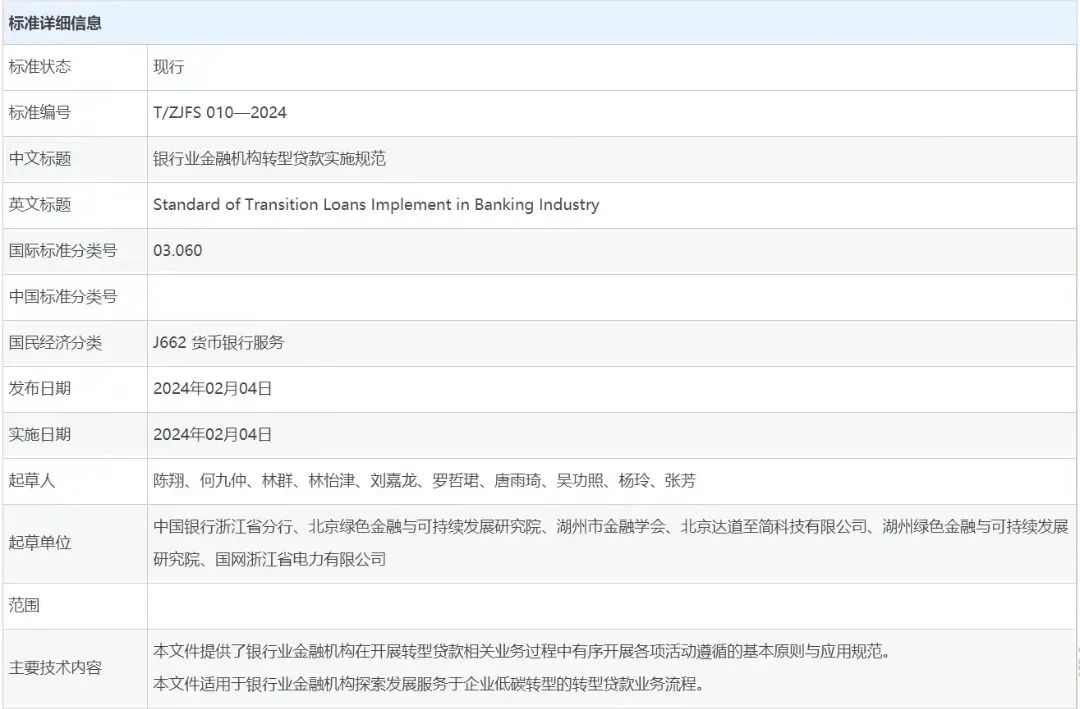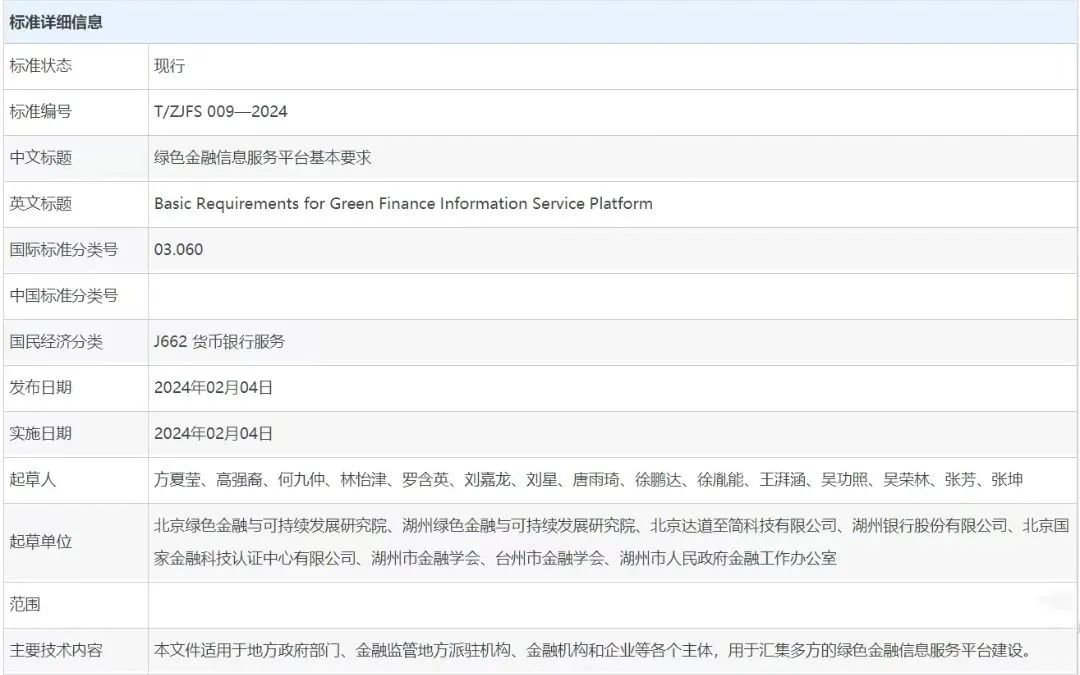Actively promoting transition finance is a pivotal strategy that guides China's comprehensive and orderly green and low-carbon transition. In recent years, Zhejiang Province has made initial strides in exploring transition finance development through policy directives, standard formulations, platform establishments, and product innovations, yielding notable initial results. Recently, the Finance Association of Zhejiang Province successively released three group standards, including Transition Finance Support Activity Catalogue in Textile Industry, Implementation Guidelines for Transition Loans by Banking and Financial Institutions, and Basic Requirements for Green Finance Information Service Platforms. These standards reinforce regulatory guidance, and encourage financial institutions to enhance support for green and low-carbon transitions of high-carbon industries and enterprises.
Group Standard I: Transition Finance Support Activity Catalogue in Textile Industry
As a traditional pillar and vital livelihood industry in Zhejiang and nationwide, the textile industry stands as a notable high-carbon emitter. Developing and implementing transition finance standards for the textile industry is essential to channel funds precisely into the green and low-carbon transition of the industry. Led by PBOC Zhejiang Branch and the Economy and Information Technology Department of Zhejiang Province, this Standard was initiated and drafted by PBOC Huzhou Branch, Zhejiang Changxing Rural Commercial Bank, the People’s Government of Jiapu Town, Changxing County, IFS and Zhejiang Huzhou Weida Group Co., Ltd., among others. The Standard merges national, industry, and provincial and municipal policies with textile industry blueprints, maps out practices of textile firms across regions, and extensively incorporates expert insights. It consolidates 68 advanced technological pathways across three key manufacturing stages, namely raw material production, weaving and dyeing, and finished textile manufacturing, to propel low-carbon transitions and high-quality growth for enterprises. Moreover, the Standard further suggests establishing a database of transitioning enterprises or projects, guiding financial institutions in adopting transition finance practices, and strengthening policy instruments to support transitions, thereby ensuring the practical application of the Catalogue. The Transition Finance Support Activity Catalogue in Textile Industry curtails the transition activity identification costs for textile enterprises and financial institutions, fortifying the base for the precise implementation of transition finance plans.

Group Standard II: Implementation Guidelines for Transition Loans by Banking and Financial Institutions
Transition loans constitute a primary mode for banking and financial institutions to engage in transition finance. In this mode, banks need to establish business practices that not only adhere to the logical framework of credit operations but also give due attention to the low-carbon transition performance and associated risks of their clients. This Standard was initiated and formulated by Bank of China Zhejiang Branch, Finance Association of Huzhou City, HZGF, and State Grid Zhejiang Electric Power Co., Ltd., among others. The Standard, grounded in the principles of compliance, effectiveness, and controllability, outlines a process flowchart for transition loan operations. It sets requirements for critical stages in transition loans, including pre-lending assessment, transition objectives and plans, loan approval, loan disbursement, and post-lending supervision, and guides banking and financial institutions to integrate the requirements appropriately into credit allocation procedures. The Implementation Guidelines for Transition Loans by Banking and Financial Institutions empowers banks to refine transition loan business processes, bolstering "Transition-washing risk" prevention by establishing management systems, enhancing specialized capacity and creating management tools, thereby fueling the economy's green and low-carbon growth.

Group Standard III: Basic Requirements for Green Finance Information Service Platforms
In the pursuit of green finance reform and innovation, Zhejiang Province actively develops digital platforms. The Green Finance Information Service Platform leverages fintech tools to alleviate green project financing challenges, enhance information transparency, and streamline data management, thereby boosting the delivery of efficient and high-quality green financial services. The Standard is a collaborative effort by Bank of Huzhou Co., Ltd., Finance Association of Huzhou City, Finance Association of Taizhou City, Finance Office of the Huzhou Municipal People's Government, Trans Fintech and the Beijing National Financial Technology Certification Center. This Standard outlines construction principles and service targets for green finance information platforms, streamlines essential functions, establishes implementation paths from data preparation to functional module design, and sets guidelines for platform monitoring and updating to render a comprehensive, secure, and operational system. The Basic Requirements for Green Finance Information Service Platforms offers a valuable reference for constructing comprehensive green finance service platforms fueled by groundbreaking fintech innovations, by merging government, banking, and enterprise resources and needs to aid local green and low-carbon transitions.

Please click the link below to view details on the three group standards.
1.https://www.ttbz.org.cn/StandardManage/Detail/104127/
2.https://www.ttbz.org.cn/StandardManage/Detail/103695/
3.https://www.ttbz.org.cn/StandardManage/Detail/103694/
Source: the Finance Association of Zhejiang Province


